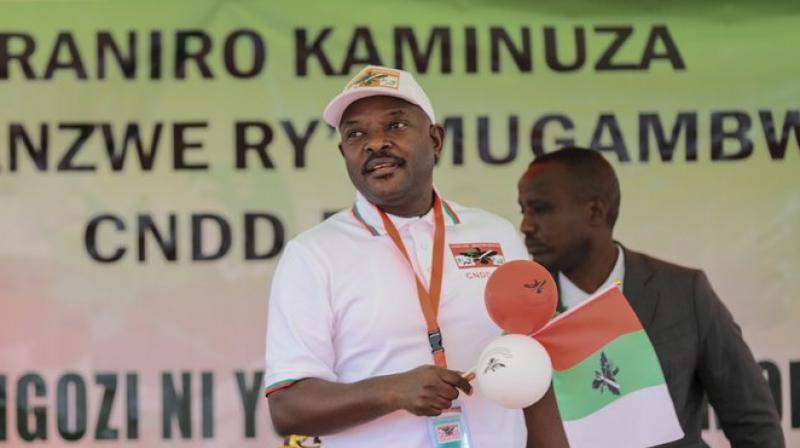Burundi: Officials declare president died of coronary attack, many suspect virus infection
10 June, 2020

Burundi’s President Pierre Nkurunziza features died of a coronary attack at age 56, the federal government announced Tuesday, closing a good 15-year-rule marked by deadly political violence and a historic withdrawal from the International Criminal Court.
The statement posted on social media said the president was admitted to a hospital overnight Saturday after not feeling well. He came out better Sunday but “to very superb surprise” his health abruptly worsened Monday morning, and many hours of effort failed to revive him.
Burundi’s government provides declared weekly of mourning.
Nkurunziza’s death comes weeks before president-elect ruling party prospect Evariste Ndayishimiye was likely to be sworn on after winning the Might election. It had been not immediately clear what the government’s steps will get and a spokesman was not available for comment.
“According to Burundi’s constitution, when a president dies in office before handing more than power, the loudspeaker of parliament gets control and organises a brand new election. But I think the leadership will ignore this requirement and choose with Evariste Ndayishimiye,” explained David Gakunzi, a Burundian author.
Regardless of the government’s statement, most in Burundi wondered whether Nkurunziza died of COVOD-19 instead. “When Nkurunziza’s wife was flown to Kenya experiencing COVID-19, many in Burundi suspected the president himself was sick,” explained Justin Nyabenda, a resident in Bujumbura. He was referring to reports in Kenyan media that Nkurunziza’s wife, Denise, was hospitalized in Nairobi for COVID-19 in late May.
Burundi’s government has downplayed the virus and kept the election and large campaign rallies regardless of the threat. Authorities kicked out the World Health Organization’s top official in the united states just days before the election following the WHO brought up concerns about crowded rallies. The united states possesses reported 83 virus cases.
Nkurunziza took office found in 2005, chosen by lawmakers to lead the East African nation following the 1993-2005 civil war killed about 300,000 people. He and Ndayishimiye fought alongside one another as rebels in the conflict.
The peace process referred to as the Arusha Accords specified a president’s term could be renewed only one time. But Nkurunziza, who gained a second term in 2010 2010, released he was eligible for a third term in 2015 because he had not been picked the first time by universal suffrage.
The deadly turmoil that followed badly damaged ties with the international community, and Burundi became the first country to leave the ICC after it started investigating allegations of state-sponsored crimes including murder, rape and torture.
The US human rights office reported a lot more than 300 extrajudicial killings and was later kicked out from the country after outgoing U.N. rights chief Zeid Ra’ad al-Hussein known as Burundi among the “virtually all prolific slaughterhouses of humans recently.”
Burundi’s government possesses denied allegations it targets its people, contacting them malicious propaganda by dissidents.
U.N. Secretary-General Antonio Guterres dispatched condolences to the federal government and people of Burundi and also to the president’s family.
“The scretary-general reaffirms the willingness of the US to support the government and people of Burundi because they face the COVID-19 pandemic and within their continuing efforts to make a stable, prosperous and peaceful future for all your country’s citizens,” U.N. spokesman Stephane Dujarric explained.
Nkurunziza survived a good coup attempt soon after the 2015 vote. International donors cut support, departing the government struggling. Thousands of people fled the united states.
“Various Burundians will remember Nkurunziza as a president who left out a divided country,” said author Gakunzi. “When he arrived to power following the Arusha agreement, citizens expected peace and prosperity. However, his greed for power in 2015 divided the united states and sent various to are in exile.”
Various Burundians were surprised when the president announced in 2018 that he was serving his last term. Many thought he would continue steadily to wield power behind the scenes. The opposition head who misplaced the May election, Agathon Rwasa, said his supporters had been harassed ahead of the vote and arrested by the scores on election day. His court challenge to the vote alleging fraud was rejected.
The government had approved legislation designed to bestow upon Nkurunziza the title of “paramount head” once he stepped down.
Nkurunziza “leaves behind a legacy of ruthless repression,” said Lewis Mudge, Central Africa director at Human Rights Watch. “He ruled through fear to erect a system synonymous with the worst human rights abuses: extrajudicial killings, torture, disappearances and the systematic crushing of dissent.”
Burundi must investigate the crimes, Mudge said. “Given that these abuses proceed unpunished, this dark legacy will hangover Burundi for several years to come.”
Source:
TAG(s):
